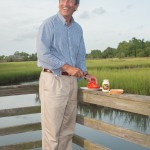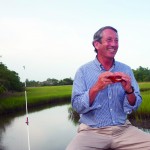The sun has been up for barely two hours, but already it’s obvious that this will be another sultry, sticky day in the Lowcountry. The Belk store in Mount Pleasant’s Towne Centre has chosen today to celebrate the company’s 125th birthday, and among the guest speakers is U.S. Rep. Mark Sanford, the fiscal conservative who represented the Palmetto State’s 1st District from 1995 until 2001, served as governor from 2003 until 2011, then disappeared from the political arena for two years.
Sanford, the survivor among 19 candidates who sought the congressional seat vacated when Gov. Nikki Haley appointed Tim Scott to replace Jim DeMint in the U.S. Senate, is hoping to write a new chapter in his political biography and promising to pick his fights more carefully this time around. Much has changed in Sanford’s life, both personally and politically, since he came home from Washington. His message remains the same, however: Government spending on the federal level is out of control and something needs to be done about it.
Sanford doesn’t mention the national debt or the nation’s penchant for deficit spending during his generic speech to the Belk crowd. Following his presentation, many of them file inside, hoping to claim the prizes the store is offering during its birthday celebration. Some of them remain outside, however, hoping to speak with Sanford or have a picture taken with him. He munches on cupcakes with dollops of bright icing as he makes small talk with the people who helped send him back to Congress.
He finally finds the time to sit down and talk with me, but minutes after our conversation begins, his assistant, Zach Lamb, gently reminds him that it’s time to move on to their second of five stops. At ABC Medical, he will meet with representatives of local businesses that provide services to Medicare recipients. I let Sanford know that I have the time to follow him to North Charleston, and he offers to drive and talk while I ask questions and write. He seems a little put off that I would have the temerity to ask if he can handle a manual transmission. He doesn’t know that only three other people have been behind the wheel of my 13-year- old car, and I choose not to inform him of the great honor about to be bestowed upon him.
On the way to North Charleston, Sanford informs me that his focus hasn’t changed since his last stint in Congress. He adds, however, that he has tweaked his method of reaching his goals. Politically speaking, he has a better idea of how things work in Washington, and he plans to use his experience to his advantage.
“Life is a series of course corrections,” he explains. “I understand the process better now, and I’ve narrowed my focus. I know I can’t pick 25 fights on government spending, so I’ll just pick five fights.”
He points out that waste, fraud and abuse are obvious areas where federal spending can be slashed, but he adds that the ever-increasing cost of entitlements – Medicare and Social Security – must be addressed.
“There’s a tipping point and remarkable consequences if we don’t get it right this time,” Sanford says. “Debt is a huge issue that can sink us as a civilization.”
Sanford clearly believes that the people of the 1st District chose to send him to Congress again because they agree with his efforts to cur- tail government spending. He adds that his eight years as governor of South Carolina provided him with valuable experience on economic development issues. He cites his efforts to help bring Boeing to the Lowcountry as proof that he can deal with people in the business world. And he points out that during his previous three terms in Congress, he developed relationships with other congressman that will be helpful is his efforts to represent the interests of his constituents in the Lowcountry.
After six years in Congress and eight as governor of South Carolina, Sanford could certainly be considered a career politician. However, he says that given the choice between experience and new blood, he would prefer to see the country run by people with new ideas, rather than by those who have spent a lifetime living off the government.
“The whole idea of term limits is so people won’t make a career out of politics. When congressmen make decisions based on keeping themselves in office, that’s the beginning of the end. That’s not in the best interests of the people. Having new blood guards against losing perspective of where the money comes from and how hard it is to earn, from the taxpayers’ viewpoint.”
“It’s important to go Washington knowing that you’ll eventually be leaving,” he says, adding that he won’t serve in Congress for more than 12 years. “If people make decisions based on staying in office, nobody will lead on controversial issues. That’s why we can’t get anything done on entitlements. It’s politically risky. Politicians must take risks.”
After listening to comments and suggestions from medical suppliers, Sanford moves on to his third stop of the day. This time, Sanford rides with Lamb, and I drive my car to a meeting of families who belong to the local chapter of the Juvenile Diabetes Research Foundation. Sanford listens as they talk about the issues their children face and the need for government funding. A few tears are shed as parents describe the hurdles their young children must navigate. Though the congressman often is averse to federal spending of any kind, he seems to empathize with their plight.
I’m ready to return to Mount Pleasant, but Sanford has a long way to go before his busy day comes to an end. He and Lamb head west for lunch with the Summerville Rotary Club, then return to North Charleston for a meeting at the Space and Naval Warfare Systems Center Atlantic. Despite the hectic schedule, Sanford appears to be much more comfortable meeting with constituents in the Lowcountry than dealing with lobbyists and lawmakers in the nation’s capital.
“I’d rather spend time along the coast of Carolina,” he says. “That’s where my home, my farm and my family are. I like to hear from people on a regular basis, and that’s not possible if I’m not in the district.”
Story by Brian Sherman
Photography by Kate McKinley and Brian Sherman



Hi Y’all. I enjoyed reading the article about Mark Sanford and his trip around the state. Can anyone tell me where that local group of the JUVENILE DIABETES RESEARCH FOUNDATION he went to visit is??
I want to join this group with a friend. Please send me any info you might have for this group in the Charleston area. Thank you, Louis Prantil